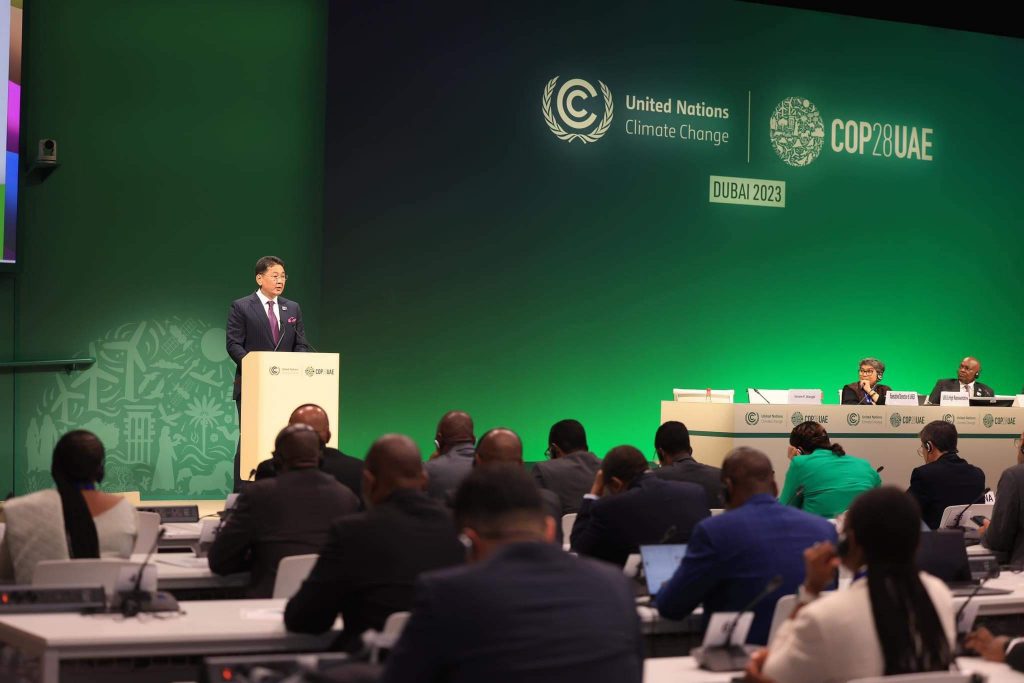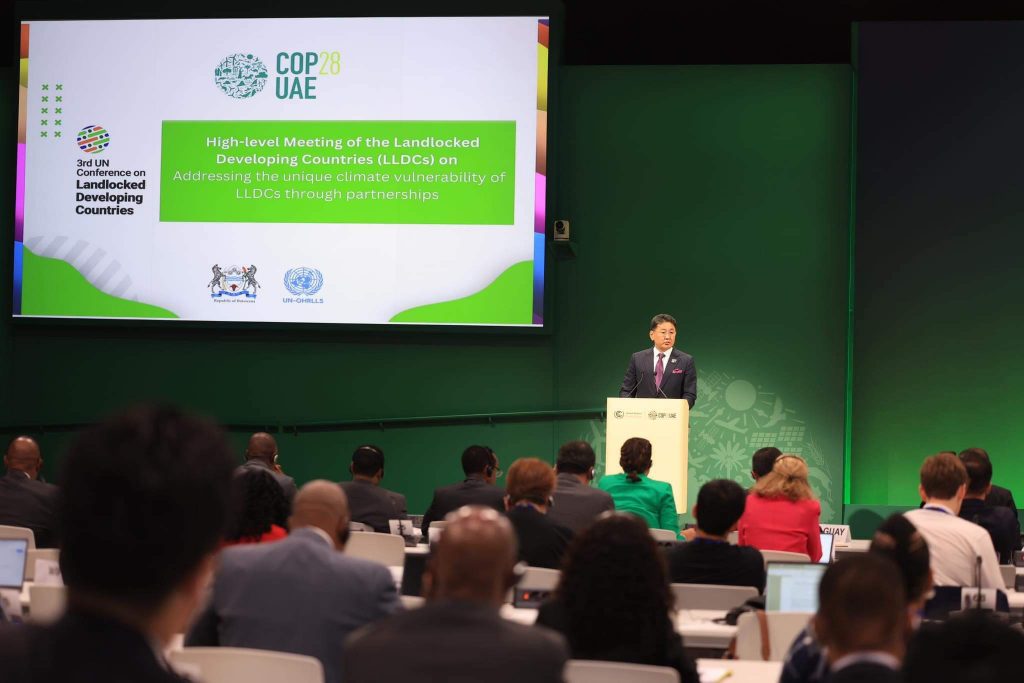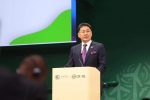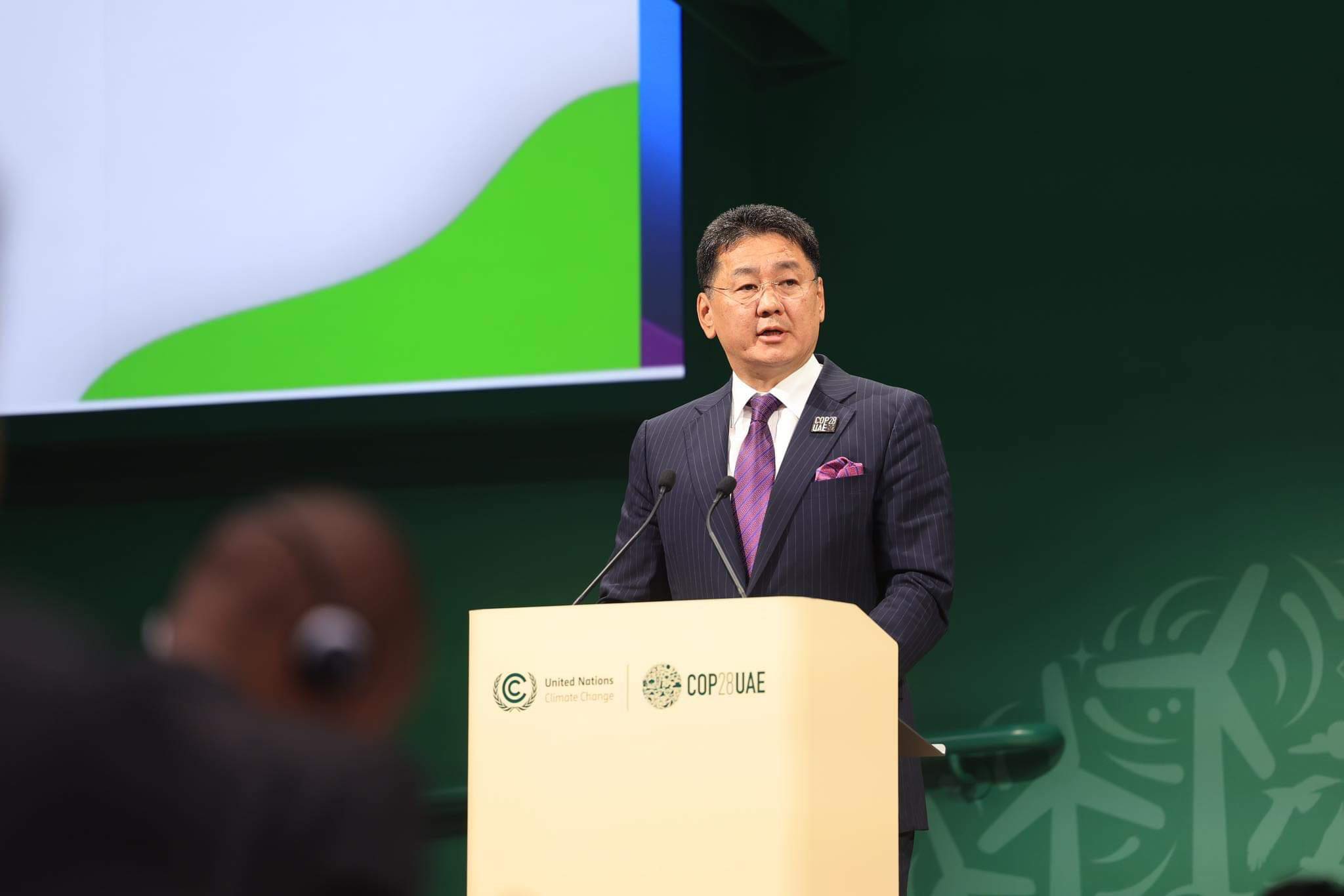STATEMENT AT THE HIGH-LEVEL MEETING OF THE LANDLOCKED DEVELOPING COUNTRIES ON “ADDRESSING UNIQUE CLIMATE VULNERABILITY OF LLDCs THROUGH PARTNERSHIP”
STATEMENT BY H.E. MR. UKHNAA KHURELSUKH, PRESIDENT OF MONGOLIA, AT THE HIGH-LEVEL MEETING OF THE LANDLOCKED DEVELOPING COUNTRIES (LLDCs) ON “ADDRESSING UNIQUE CLIMATE VULNERABILITY OF LLDCs THROUGH PARTNERSHIP”
Dear Secretary-General of the United Nations,
Dear Chair of the Group of Landlocked Developing Countries,
Distinguished delegates,
Ladies and gentlemen,
Today, humanity is living in a most critical time, having witnessed the hottest year on record for global climate since industrialization. We are facing the urgent need to intensify the global fight against climate change and achieve tangible results.
Disasters such as extreme heat, fires, droughts, and floods are occurring worldwide, causing considerable damage to the environment and human society. Millions of people have lost their lives due to war and hunger, and the number of refugees forced to abandon their homes has been increasing year by year.
I appreciate the initiative of the Chair of the Group of LLDCs to convene this timely and essential event in these difficult times.
The LLDCs, while facing numerous challenges, including remoteness from international markets, high foreign trade costs, and dependence on transit countries, are most affected by climate change.
Although Mongolia emits only 0.1 percent of the world’s total greenhouse gas emissions, it is among the countries strongly affected by climate change.
Mongolia supports the initiative with a view that the operationalization of the “Loss and Damage Fund,” designed to provide assistance to climate-vulnerable countries, will serve as crucial encouragement for nations with special needs.

Mr. Chair,
Mongolia serves as the Vice Chair of the Group of LLDCs at the United Nations and is working on an initiative to set up a group of LLDCs at the World Trade Organization and the International Civil Aviation Organization.
Mongolia is committed to enhancing its national contribution to global efforts in combating climate change, desertification, and global warming. In this context, we have initiated and are successfully implementing national movements such as “Billion Trees,” “Food Supply and Security,” and “Healthy Mongolian”.
Mongolia acknowledges the importance of women’s participation and leadership in combating climate change; hence, in collaboration with the United Nations, we will host the World Women’s Forum in 2024 to deliberate on this pressing issue.
Mongolia also has proceeded with preparations for hosting the 17th session of the Conference of the Parties (COP17) to the United Nations Convention to Combat Desertification (UNCCD) in 2026.
Furthermore, I wish to highlight that the UN General Assembly adopted the resolution entitled “International Year of Rangelands and Pastoralists, 2026” at the initiative of Mongolia.
I would like to invite you all to participate in the above-mentioned important forum and conference to be held in our beautiful country, Mongolia, the land of eternal blue sky.
Mr. Chair,
Research driven by science-based actual data is needed to overcome the unique challenges posed by climate change in LLDCs.
Thus, our country initiated the establishment of the International Think Tank for Landlocked Developing Countries (ITT) in Ulaanbaatar, developed and strengthened it to become an independent intergovernmental organization, and has been making a valuable contribution to formulating development policies for LLDCs through the think tank.
We appreciate the ITT for undertaking high-level researches, which is crucial for the members of the Group of LLDCs in collaboration with the United Nations for the last ten years.
The ITT is capable for conducting researches and studies that contribute to mitigating climate change, overcoming its adverse impacts, and defining effective policies, strategies, and cooperation, particularly in the climate-vulnerable sectors of food, agriculture, and energy in LLDCs.
Therefore, I urge all LLDCs to collaborate with the ITT on implementing research projects.
Moreover, I call upon LLDCs that have not yet ratified the Multilateral Agreement for the Establishment of an International Think Tank for LLDCs to do so. By doing this, we believe the ITT will further enhance its research capacity, increasing the opportunity for research teams from LLDCs to work together on undertaking large-scale studies.

Mr. Chair,
As Mongolia places high importance on the Third UN Conference on LLDCs to be held in Kigali, Rwanda, in 2024, the country is actively participating in its preparations.
We are confident that, drawing from the experiences and lessons learned from the implementation of the Vienna Programme of Action, this dedicated conference for LLDCs will be a critical occasion to adopt a renewed development framework for the next decade.
In conclusion, I wish to emphasize that unity, mutual understanding, partnership, and cooperation, coupled with bold decisions and consistent efforts of LLDCs, are of utmost importance for overcoming the challenges that we face, successfully implementing our goals, and building sustainable development.
We, Mongolians, stand ready to mobilize all our resources and cooperate with the international community in every way to contribute to safeguarding our Mother Earth and mitigating climate change.
May the Eternal Blue Sky bless the humanity forever.
Thank you for your attention.


